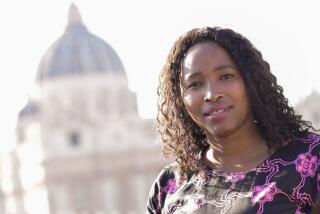Searching for Spiritual Authority for Women
- Share via
Ronda Chervin’s one-page resume is an immediate indicator of her values and priorities:
Dr. Ronda Chervin is a wife, mother, grandmother, professor, author and international lecturer.
Raised in New York as what she terms a Jewish atheist, Chervin converted to Roman Catholicism at 21, mainly because of her philosophical studies, she says, and the way Catholic philosophy enabled her to value being a woman.
She could think of the body, she says, not just as a sex object, and not just “as a carcass to be eaten by worms, but related to the birthing process of an infinitely valuable human being. . . . Being a mother is not the same as being a cow. There’s a great purpose in creating this person with eternal destiny, eternal perspective.”
The 54-year-old philosophy professor now teaches ethics and the philosophy of women and men at St. John’s Seminary of the Archdiocese of Los Angeles in Camarillo.
In most respects, Chervin is a traditionalist regarding Church teaching and practice.
More specifically, she opposes artificial contraception, abortion and ordination of women; she accepts the existing Church structure, attributing what she calls any occasional abuses to the wrong kind of leaders instead of the system itself.
She values women’s traditional roles as wife and mother but does not limit women to them. Rather, she encourages women not to fearfully rule out the possibility that the Holy Spirit may lead them to use their gifts in other ways, such as activism and the arts.
Chervin calls for change in the Church and believes women “who love the Church” should have increased leadership positions. But she says she is more interested in spiritual than secular authority for Church women.
She mentions how Pope John Paul II frequently consults with Mother Teresa and talks of the power of women mystics, of the women who founded religious orders, hospitals and orphanages.
“This is not being second class,” she says. “It seems to me the first-class citizens in the Church are the saints.”
As a consultant to the bishops’ committee on women, Chervin says she has made it her role to emphasize that Church teachings are “good and true and why (they are) not incompatible with women’s leadership.”
Chervin speaks about the Church with a recent convert’s freshness and fire.
Her life as a Catholic has been positive, and she readily acknowledges that she has not experienced institutional oppression.
Through her committee service, though, Chervin says she has seen how other women’s experiences and feelings could be different:
“I’ve really come to grips with recognizing the pain involved in the lives of women who do feel crushed in different ways. It’s not my experience, but I’ve had to feel it.”
More to Read
Sign up for Essential California
The most important California stories and recommendations in your inbox every morning.
You may occasionally receive promotional content from the Los Angeles Times.













